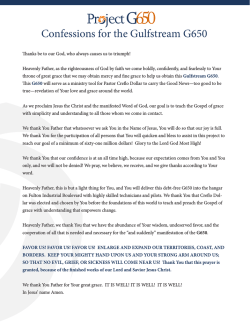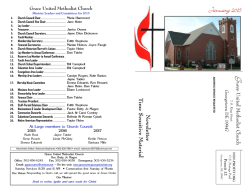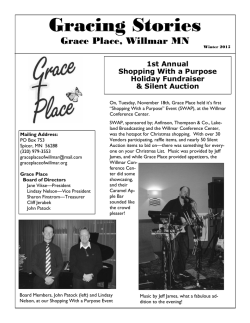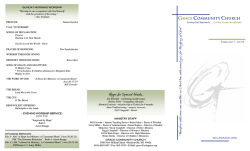
7 - Faith Community Bible Church
Well we come today to the last of our shotgun blast of topical messages surrounding this idea of how to change according to Ephesians chapter 4. Paul compares sin and righteousness to clothing. And he says if you want to change, then you need to take off sin, renewing your mind and then putting on righteousness. And so we’ve been looking at the last part of chapter for topic by topic and seeing how exactly to apply that principle to specific issues like anger or theft or lying. And today we come to a topic that of all topics we have discussed thus far has the most application simply because we have opportunity to obey or disobey hundreds of times a day. We are talking about our speech. Ephesians 4:29, “Let no corrupting talk come out of your mouths, [there is the take off portion; get rid of that nasty speech.] but only such as is good for building up, as fits the occasion, that it may give grace to those who hear.” [that is the renewal of the mind and the putting on] What a verse. What a verse! Lord help us apply this verse. So here is our outline for the day. And you can see it comes right out of the text. The power of words to destroy The power of words that build up The power of words that fit the occasion The power of words that give grace Now just so you know, the weighting of the outline is on purpose. It’s would be very easy to fill up an entire sermon on examples of words that destroy. All anyone would have to do is just sit down and start typing and the examples would just flow for a 13 week series. No problem. So we need to intentionally throttle it back. We do want to include a bit of that and remind that indeed this is a serious problem but then we want to move onto good examples. And these are much more difficult to discuss since they are fewer and farther between and we have far less experience with them. The Power of Words to Destroy Others If you open up the book of Proverbs you will see that far and away the topic that comes up most is the topic of words. I remember one time I read through the book of Proverbs and every time a proverb had something to do with my speech I put a little mouth by it. And it was humorous to look back on that list and see hundreds of little mouths smiling at me in the passage. Now one Proverb in particular that speaks to the power of words and particular the power of words to wound is Proverbs 12:18, “Reckless words pierce like a sword …” The NAS translates it “There is one who speaks rashly like the thrusts of a sword,” (Pro 12:18 NAS) This is talking about slashing words, reckless, rash promises, set-up expectations and disappointments that can never be taken away. Rash or reckless statements destroy your credibility that wound other poeple. All of these words are like thrusts of a sword. And think about; certainly, reckless criticisms, cutting remarks, can sour a relationship in a way that it can never really be healed. If you decide to unsheathe those words they can’t be re-sheathed. Now we don’t live in a culture where we have swords and spears. So I brought here a machete for you to think about this. You’d be horrified at the thought of taking this weapon and thrust it into the arm of another man. And if I said to you, “Well, it’s not that bad. There are thousands of men in history who have been stabbed in the arm and survive. Go ahead and stab him.” You’d object: That is horrible. Think of the damage a sword like that could do. Suppose we can stop the bleeding and he does survive, it would leave a nasty scar that would remain for the rest of his life. Every time he looked at it he would remember back to that moment when I just lashed out and thrust this sword into his flesh. Our words are sharp weapons and we wield them so carelessly. You don’t practice your dance moves in a crowded mall with a couple of swords in your hand. That would be so careless. And yet so often with our words, they just fly out of our mouth unchecked. What are our words doing when they land upon their victim? “What’s your problem?” “Why don’t you just take a second and use your brain?” “Are you totally inept?” “You don’t care a single bit about our family? “If you cared about our relationship, you would….” “You are so incredibly pig-headed.” “All you care about is yourself?” “You think you are so high and mighty?” Often times, especially with those that are closest to us, we are most skilled at finding the soft side underbelly. This verse is saying that the heart is like a soft piece of flesh and even though we can’t see it happen those words slice right into that soft core and the soul bleeds out. There a phrases and names that we call one another and sentences we speak that are like sword thrusts right into the heart. And this is the perfect picture we need to keep in our minds for the power of our words. Words can have the power to do damage that can’t be remedied. Listen to that. There are certain things that once said will NEVER be forgotten. All the apologies in the world will not undo the memory. Sure the person might forgive you. But what does that even mean? We talk about forgiveness as a moment in time that only has to be done once. What a crazy misconception. Let’s say, in the heat of the moment someone yells in your face, “You’re a sick human being.” That’s a sword thrust into the heart up to the hilt. And when that sword is pulled out of you, the sword is out but it didn’t pull the wound out with it. Every single time those words are recalled you are going to have to forgive them. Again and again for the rest of your life. That is going to leave a nasty scar. And so none of us should dare think that just because a word can be forgiven does not mean that it doesn’t continue to hurt. I know many people who envision themselves as heroes for apologizing for some harmful word that were spoken. And then they get all inflamed in anger when the person who they hurt don’t jump up in warm embraces for their brave act of confession. Now to be sure, the act of confession was good and necessary. And that person probably feels much better for having gone through that process. God has forgiven them and they have certainly received the forgiveness of God. But they aren’t looking at it from the person who is still bleeding out on the floor. If you say, “Okay, I’m so sorry I said that. Will you forgive me? That’s the equivalent of pulling the sword out. But again, when you pull the sword out, it doesn’t take the wound out with it.” Here’s how Proverbs 18:21 says it. So simple. So true. Proverbs 18:21 says, “Death and life are in the power of the tongue.” We talk about registering hand guns. What’s the idea behind that? A gun has so much power. A single careless shot and we end a man’s life. So as a society we’ve said, “Wow, that is a powerful weapon. Perhaps we should have people register these powerful weapons. That way there is an additional layer of accountability. It might make someone think twice. This is a powerful weapon. In the heat of anger and rage, are you really sure that shooting someone is the best course of action. God wants you to register your words in a similar way; he wants you to realize just what kind of power they have to heal and give life or bring persecution and death. In our text the command is to not allow corrupting talk to come out of your mouth. The Greek word here is saphros which means rotting. A derivate of this word is Sarcophagis which is a box usually made out of stone which holds the bones of a dead man. The idea of rotting flesh is another good picture to have in your mind. Corrupting, rotten, foul words. Have you ever gone camping or pulled over on the side of the road next to a dead animal that is on the high day of rot. The stench is just unbearable. It makes a person gag. Have you ever been around a person with really bad breath? And they are probably unaware of it and they are just kind of spewing it everywhere. They are talking to you and your trying to find a pocket of fresh air but you have day old garlic and onion just coming out in sticky clouds. Is that how you want to be know by others? And so we are instructed not to speak harmful corrupting words because it hurts other people, and usually people we love the most. The Power of Words to Destroy You Now there is another category of thought that we should include here. We almost think exclusively of our words as damaging to others. And of course that is the primary consideration. But we’d be very shortsighted if we did not consider the damaging power of words over the person who speaks the words. If you feel hatred toward someone, that’s hard to deal with. We talked about anger a couple weeks ago; when you are angry at someone, this is a very strong emotion. But that’s just a feeling inside your head. Consider the difference between struggling with that emotion by yourself and pulling aside a friend and saying, “I hate him. I hate him so bad,” your words are clothing your thoughts with new power that now has control over you. One of the best ways for you to get yourself in the grips of bitterness is to just express it. This is one of the most dangerous aspects of gossip. You start to believe things that aren’t even true simply by expressing it. Now someone might object at this point. Well, man, I have to talk to think. I can’t know what I’m thinking unless I say it and start talking it through. That just further proves the point. It shows the power of speech. You might just have a sense that something is bothering you and you need to talk it and at the end of the conversation you are surprised. You didn’t realize how angry you were until you vocalized it. But that act of vocalizing needs to be done so carefully. Because if you state it too strongly, you will believe something that is not true. You see our heart is full of lies, too, and if you simply express the lies uncritically, those lies have a new power over you. Have you ever told a lie and after articulating it enough times you start to believe it. Clothing thoughts with words creates a reality. The liar eventually begins to believe the lies. Someone who is constantly complaining about the weather, the job, their impossible kids simply by the act of putting those feelings into words, are now caught deeper in the grip of the complaint. What was previously only a seed of discontent and had a small hold on him now is a powerful storm in their mind. And the only thing that happened was that they put the thought into words. If you just complain and complain about how everything is wrong, everything will be wrong. Words take on a power of their own. Do you really want to let that monster out of pandora’s box? Do you really want to take the tent out of the sack? You will never get it back quite the way it was. Think about it. Put off, Great! But Keep Going. Put On. So the put off section basically can be summarized, “Don’t do all that stuff we just talked about.” But what do we put on? A very important point here. Notice we are supposed to go beyond saying nothing at all. Now saying nothing at all is sometimes a good option, especially in the moment. The Proverbs also speak to this. Proverbs 10:19, “When words are many, transgression is not lacking, but whoever restrains his lips is prudent.” Proverbs 17:27-28, “Whoever restrains his words has knowledge, and he who has a cool spirit is a man of understanding. Even a fool who keeps silent is considered wise; when he closes his lips, he is deemed intelligent.” Psalm 141:3, “Set a guard, O LORD, over my mouth; keep watch over the door of my lips!” And so sometimes it is good not to speak anything. But, this is not the command in our text today. Don’t pat yourself on the back for keeping silent when stabbing, hurtful harmful words are swarming around like wasps in your mind. The heart has not been renewed. A sinful mind can speak harmful words; a sinful mind can keep silent. You are not acting on your thoughts, that is better than acting on them. But it’s still poisoning you. It’s still toxic waste floating around in the mind and will leech out one way or another. Only a renewed mind can speak words that build up, fit the occasion and give grace. So let’s look at these categories of words that Paul says is the result of a renewed mind. Ephesians 4:29, “Let no corrupting talk come out of your mouths, but only such as is good for building up, as fits the occasion, that it may give grace to those who hear.” Now that is the filter. Picture your words like a pile of gravel in your mind. And you have this screen that only allows through the little particles of sand. This verse gives us a filter. Only let the words come out of your mouth that are good for building up, fit the occasion and give grace to those who hear. So this passage is really kind of like a three stage filter for our words. The Power of Words to Build Up So let’s take a look at this first filter? What are words that build up? Well, for starters they are the exact opposite of words that tear down. Think about the imagery of those words. Build up. What that indicates is that we are currently not built all the way. That the structure would benefit from being built higher. To help illuminate the point, it would be awkward and strange to say that the reason we sing praises to God is to build him up. God is already built up to the max. We sing praises to worship him and declare who he is, but he is complete. We on the other hand need building up. We are insecure about ten thousand things. Am I beautiful? Am I competent? Am I a good father? A good mother? A good son or daughter? Am I good lover? Am I good employee? We are so insecure? Am I loved by God? Who would really go to bat for me? Do I have any real friends in the world? We need words of encouragement. We need to be reminded of truth. We need words that soothe in moments of pain and tribulation. We need words that build up our shaky souls. Words like, “I just want you to know that I love you” “Hey, even though things have been rough lately, I just want to say that what originally attracted me to you still is there.” “You know what; I’m just encouraged that we love the same things and have the same goals. What a blessing that is. I love you.” “You are such a good friend.” Do you hear the power of those words to build up? Another way of thinking about this concept of building up vs tearing down is to think in terms of trust. Words that build up are words that build trust in the relationship. Words that tear down are words that destroy trust in the relationship. There is no such thing as a neutral word. Either our words are building trust or tearing it down. We don’t enter relationships trusting one another. We have enough experience with people to realize that you can get hurt if you open up about your weaknesses. So we always asking the question? Can I really trust this person to open up with them about the things that are troubling me If I share a weakness will they use it against me? What will this person do with this piece of information that I give them? Words that build up are words that affirm that my love for you extends even to your sin and imperfection. When a weakness is shared, building words are words that say, “I struggle with that same thing, how can we help each other.” Those are building words. Those are words that increase trust. Often times what happens in very bad marriages is that the spouses have become accustomed to jousting back and forth in such a way that they take whatever trust is left in the relationship, and get them to reveal some possible weakness and then once the person takes a chance and disclosed an apology or a confession or turns over a leaf of softness they will grab it and grind it into their face. The hardest things to undo in a failed marriage is damaged trust. How did it get there? Words. Words destroyed the trust. Words shattered faith. Use your words to build one another up. Use your words to establish trustworthiness with those around you. If someone has developed a reputation as a trustworthy counselor, I guarantee you without a shadow of a doubt that they are also someone who builds others up with their words. They speak words of encouragement nonstop. I have even know people who are very poor counselors but get asked to counsel all the time because they are such encouragers. The Power of Words that Fit the Occasion Here’s another screen to apply. Do your words fit the occasion? Wow, I love this category of words. Words that fit the occasion. These are words that take into consideration the context of the moment. This is definitely a learned skill. It takes lost of wisdom to say considerate, helpful words at the right time in the right way. There are certain moments in life when a single sentence of encouragement, a single word of admonishment, a certain sentence of insight, a certain pearl of speech placed just right will never be forgotten. These are life giving, healing words. Proverbs 25:11, “A word fitly spoken is like apples of gold in a setting of silver.” Proverbs 15:23, “To make an apt answer is a joy to a man, and a word in season, how good it is!” I remember when I was in seminary and I was up to my eyeballs in work and family responsibilities and church and as a seminary student I was sitting in on the elder meetings. And I remember leaving Lisa and the kids and going to the meeting. And Lisa was having a hard day and she cried as I left because she wanted to hang out and I wasn’t able to and it just ripped my heart out. And I remember just getting sick to my stomach on the way to the meeting thinking to myself, “Lord I can’t win. If I don’t go to the meeting I will not be responsible to my commitment there but if I go to the meeting, I am not meeting the needs of my family. What am I supposed to do?” And I remember midway through that meeting, the children’s ministry pastor whose name was Brock Bolde asked me how I was doing? And I could tell he really cared. And so I told him, “Not very good.” And I explained the situation. And he looked me right in the eye and said, “Get out of here. Seriously, leave. This stuff is meaningless compared to what is waiting for you at home.” And I can’t tell you how that made my heart soar. So powerful. Even in ministry it’s possible to want to be a man pleaser at the cost of your own family. He had no idea the kind of impact that word had on me. Two sentences he spoke at the right moment, laced with wisdom and sympathy and they stuck with me for life. I hardly even knew the guy and yet I named my son after him; it’s hard to believe but it’s true. What’s that say about the power of a word spoken at the right moment to bring healing? I remember in high school a teacher of mine that I really respected put a note in my locker thanking for something I had done. What an encouragement that was to me. How many things do I have in my head from 20 years ago. Hardly anything. But here a word spoken at the right moment just stuck with me and will never leave. Sometimes at night my boys will say to me, “Dad you are the best dad ever.” Or Lisa will say, “I am the luckiest girl in the world to be married to you.” Now I know that is not true. I can review my failures in the day and think to myself, that is crazy talk. I have been inconsiderate, selfish, mean spirited. I have been defensive about things that I should have fallen to the ground in repentance. These words are so undeserved and in that moment of feeling just bitter and guilty and worthless come those words. Talk about gracious fitting words. I won’t forget those words. I know they are accepting me in the midst of my failure. What can you say to encourage a man or woman in a place of discouragement? How long would it take you to just say something encouraging? I think about the teacher that wrote me the note in college. It probably took him 3 minutes. Those are three minutes well spent. We spend hours and hours and hours of our lives doing things that absolutely will be forgotten. But a word spoken wisely in the moment. It is a jewel. I remember in school a pastor said to me, “You know Jason, you have this big name preachers out there. But they will never be able to love a person through suffering. They will never be there for the person in your church who just lost a father or a mother or is struggling with a son or daughter who is not walking with the Lord. You have the opportunity to be a power in the life of that person like nobody else. A person in a moment of crisis is thirsty for your fitting words. The human spirit is so frail and fragile. A tender word in a moment of pain is so powerful. The Power of Words to Give Grace Here’s another filter to apply! Will your words give GRACE to those who hear? If not don’t say it. Now this is such an important category of words… such an important category. Why is it so hard to say nice things to people? Why is it so hard to actually open your mouth and let words of encouragement out and appreciation and edification? If it really only takes three minutes and a person will remember it for life, I mean why not? Why is the world not filled with Hallmark cards? Why is it so hard to just be constantly, nonstop kind with your words? Well the reason is because generally speaking people are legitimately undeserving of it. If you say to someone, “I really appreciate how considerate you are to me.” “Honey, I appreciate your loving spirit.” “You are such a kind person.” Well, if you want to just boil it down to a factual analysis of life, that’s pretty overstated. Generally speaking we are inconsiderate, unloving, self-absorbed and unkind. I’d hate to see the chart that comes out of my average day. When we are yielded to the Spirit we exhibit his fruits, and we should absolutely praise and encourage when we see these things, but truth be told, there are a lot of things we have to overlook between spurts of Holy Spirit activity. Nobody deserves it. If you are going to wait till someone is deserving of your kind words, you will die with nothing but bitterness on your lips. Nobody deserves an ounce of it. But don’t let that stop you. Who ever said someone needed to earn your kind words. Is that way you want to be treated? Were you not swept off your feet by the kindness of Jesus? As Romans 2 says, “it was the kindness of God that led us to repentance.” Well, then sweep others of their feet! Extend graciousness. What a blessing! This is the main idea and the entire point of grace. Grace is undeserved blessing. Some people like to make the distinction between Grace and Mercy and I think it’s helpful for the sake of our conversation. Mercy would be withholding punishment you deserve. So if you are slapped with a $5000 fine and the judge drops the charge, that is Mercy. You didn’t have to pay what you owed. That is awesome. If we translate this concept to our speech, it would be merciful to just be silent. To not retaliate with sharp words. To not point out the failure. That’s mercy. Grace goes beyond that. Imagine if the judge reached into his wallet and pulled out a thousand in cash and say, “Oh, by the way, here’s a little spending cash in celebration of your dropped charge.” That would be Grace. Receiving what you do not deserve. And God is wanting us to speak words of Grace. Words that are undeserved but are still true. Maybe all week long there is fighting and arguing, but then you see a slight break in the clouds and a tiny ray of sunshine slips through. And you jump on it, “I see God working in your life and I just want you to know that encourages me.” Generally speaking, those words might not be deserved; perhaps there are many words that were said that was damaging, much faithless activity, much unloving speech, but grace overrides it. Grace slathers on words of love and grace and edification that are completely undeserved. They are not untrue, they are simply graciously overlooking faults and being graciously selective in choosing which actions to vocalizing. If you want to see examples of gracious words in actions, just look at what God says to you. How much of what God says to you is deserved? A little word of warning. Be careful that in your graciousness you do not slip into patronizing. One of the sharpest daggers we can use are words of patronizing. This is the use of words whose grammatical construction appears to be kind but there in reality they are said from a perch of high superiority. “Hey your doing a really good job cleaning the house this week.” But those words condescend from your superior position. Implied, were I given the task of keeping the house clean it would be spotless. Congratulations, you have just achieved 1/10 of my excellence. A good goal in the next 10 years is for you to reach half of who I am. No credit for gracious words here. That’s a dagger up to the hilt. By the way, the only way to not be patronizing is to see your own failure. The only way to not be patronizing is to realize how much grace you have been given, to see your accomplishments as gracious empowerments by the Spirit of God not as the results of awesome personal effort. We need to give grace and give grace and give grace knowing that we have been given grace. So often we feel compelled to point out people’s failures. We might say to someone, “You know you have been so selfish today.” That statement is rarely received at face value. Usually there is some pushback. And usually it comes in the form of, “Well, that’s not very nice.” And kids and adults both respond to that by saying, “Well, it’s true.” In light of this passage that is one of the strangest come backs in the world. Why is it that we feel that we need to say everything that is true? Would you like every true thing about you vocalized here on Sunday morning? Why is that even a line of reasoning? What verse of the Bible says we need to broadcast every sin with our mouths? Of course its true. When it happened we established that. There are a million things that are true. Someone who doesn’t have the Lord might feel compelled to open their mouth and broadcast these facts. But what does God tell us to do here? He very specifically says we need to filter out the bad and only talk about those things that give grace to those who hear. I love the NIV’s translation of our text, “Do not let any unwholesome talk come out of your mouths, but only what is helpful for building others up according to their needs, that it may benefit those who listen.” Does every true thing need to be stated. ABSOLUTLEY not. What does it mean for Jesus to be full of grace and truth? Did Jesus say every true thing? Every time the disciples were being selfish, pigheaded jerks, did he vocalize that? No. What happened in the upper room when they were all arguing about who would be greatest in the kingdom? Jesus didn’t speak truth about the foulness of the heart although he could have? Why? Because I think he was constrained by this principle. His language was guarded by this filter. Will it benefit those who listen? What benefited the disciples was for him to wash their feet. John 13:15, “For I have given you an example, that you also should do just as I have done to you.” John 13:17, “If you know these things, blessed are you if you do them.” Those are undeserved words of grace. What impact his actions and words would have had. They are still benefiting those who hear them. There are a thousand true things Jesus could have said at that moment that would have been like the rash thrusts of a sword. But he instead spoke words that built up, were fitting and were gracious. What if we applied that filter on our lips? Please Lord, guard my speech so that the only thing that leaves my lips are words that benefit those who listen. Wow. What a different world we would live in if only 10 percent of people applied this. The Source of Our Words Now this message is the last of the practical examples of Paul’s admonishment to take off, renew the mind and put on. But I want to use this particular example of the importance of that middle step. It is very easy to just flip on the switch and “say the right thing” without changing the heart. Luke 6:45, “The good person out of the good treasure of his heart produces good, and the evil person out of his evil treasure produces evil, for out of the abundance of the heart his mouth speaks.” What is this passage saying, “The tongue eventually gives you away?” Jesus says in Matthew 12:36, “I tell you, on the day of judgment people will give account for every careless word they speak,” Somebody might object to that and say, “Hey, doesn’t the Bible teach that we’re justified by faith? Doesn’t the Bible teach that we’re not saved on the basis of our works or our words, but on the faith in Jesus? So what is this talking about? What does this mean that we’ll be justified on the basis of our words and condemned on the basis of our words?” The only possible interpretation is that your words reveal whether you are justified or whether you are condemned. It reveals what your heart really is. If you can’t forgive with your words, you can’t forgive in your heart, and if you can’t forgive with your heart, you don’t have the Spirit of God in you. The bottom line we eventually speak what is in our heart. It might not come out in so many words, but it comes out. Eventually your speech will slip up. That’s the thing a lot of us are really afraid of. We have things in our heart, and we have to be so careful not to let them slip out. We can’t let this person know what we really think of them. We can’t let this person know what kind of thought life we really have. We can’t let this person know that … But eventually your words do reveal yourself. Eventually your words the corrupt and foul things that are in there. That’s why Jesus says, “By your words you will be justified and by your words you will be condemned.” And so in this process of renewing our speech, don’t skip the whole renew your mind piece. Time of confession with our mouths……
© Copyright 2026






